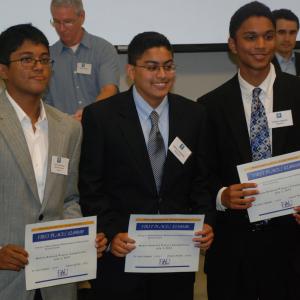FAU Engineering Scholars Program Mobile Apps Workshop

More than 25 high school students recently descended upon FAU’s Boca Raton campus to take part in an intensive three-week-long workshop called “Mobile Applications for Google’s Android,” the result of a joint-initiative between the College of Engineering and Computer Science and the Dorothy F. Schmidt College of Arts and Letters.
The workshop was one of five offered through FAU’s ongoing summer Engineering Scholars Program (ESP). Housed within the College of Engineering and Computer Science, the ESP attracted more than 120 teens from Broward and Palm Beach counties this year. The program introduces its young participants, at no cost, to the ever-changing field of engineering and computer science. Each course is worth three-semester credit hours and is geared to meet the needs of those dual-enrolled students who are curious and interested in this growing and multi-faceted profession.
As the newest and perhaps the most experimental course in the ESP curriculum, “Mobile Applications for Google’s Android” was conceived as a hands-on, project-oriented workshop that would appeal not only to future engineers but to those students with backgrounds in the arts and business. The workshop centered exclusively around the challenge of developing gaming and social applications on Google’s Android mobile phones. The latest generation of mobile phones, Android phones are constructed on open-source principles and have a number of built-in features including a Web browser, Google Map GPS, accelerometer and Bluetooth. These features were readily available to be embedded in the students’ applications for gaming, social networking and even robotics. Students used a software emulator for the phone to develop the application and a real phone to demonstrate their applications. By its very nature, these Android phones enabled student teams to leverage the work of others while building its own sophisticated applications. The added challenge for each team included the creation of a promotional video that would serve as a sales and marketing tool for the product.
The course was the only one of the five ESP courses to be federally funded from a U.S. Small Business Administration (SBA) earmark grant of $12,000. The SBA, through the grant, saw this course as the key step in creating an “incubator” center at FAU – a center that would give students from diverse backgrounds the opportunity to develop commercially feasible products. By nurturing gifted high school students, the SBA hopes to launch a new generation of entrepreneurs and in doing so strengthen South Florida’s presence in the high tech industry.
Students benefited from the course’s four faculty members – Dr. Ravi Shankar, a professor in the College of Engineering and Computer Science; Fran McAfee, an associate professor in the Dorothy F. Schmidt College of Arts and Letters; Dr. Georgiana Carvalho, an assistant professor in the College of Engineering and Computer Science; and Norman Silva, an adjunct professor in the Dorothy F. Schmidt College of Arts and Letters. Students were taught how to use Camtasia for promotional video development, Adobe Photoshop and Maya for aesthetics and animation, and Java for programming. Students also experienced posting and selling their applications on the Android market and on FAU’s own Android site.
“There are more than three billion mobile phones in the world today, and this is a rapidly evolving field,” said Shankar, who also directs FAU’s Center for Systems Integration. “Nurturing young, entrepreneurial minds in a structured environment will help to spawn new information intensive products and companies in the long run, similar to the evolution of companies like Microsoft, Yahoo, Google and Facebook.”
As the course began, students were separated into nine teams of three. Final projects span a variety of game platforms and include computerized versions of ping pong, hangman, trivia, a logic word game, and a drawing and painting game. At the course’s conclusion, the teams reconvened for a day-long event culminating with presentations.
Group number 2, the top prize-winning team, received a $2,400 scholarship funded from the SBA gift to divide amongst the group’s three members for its logic word game “Spaceman Sifter’s Letter Adventure.” Group number 8 received $2,100 for the “Nuts about Pong” ping pong game, and Group number 9 received $1,800 for its “The Five Letter Word Game.”
“All of the nine groups were winners from our perspective. We gave them a highly challenging project, and all the teams rose to the occasion and achieved that goal,” said Shankar. “Our mentors and professors also deserve credit, but if the high school students did not have that creativity, motivation and work ethic in them, nothing we did would have mattered.”
July 23, 2010